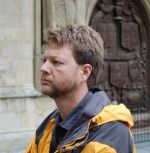Office Hours: Patrick Riley

If one were to run a Google search on the phrase “Patrick Riley Colgate,” at least three results would display that phrase. Of course, Associate Professor of French and the Chair of Romance Languages and Literatures Patrick Riley would downplay that reputation, but there is a reason why he is so well liked by his students.
Early in his academic career, Professor Riley knew that he wanted foreign language to be an important part of his life.
“I discovered in high school that I was good in foreign languages…and I decided when I was about 16 that that’s what I wanted to do for a career,” Professor Riley said in a previous interview. “That set me up for majoring in French and German in college and it went from there.”
Professor Riley does a lot more than teach and speak Romance languages, though. He also focuses on novels written in Romance languages. This semester, he is teaching two seminar courses on 18th century literature, one on the epistolary novel and the other on Libertine fiction.
“Libertine fiction is…roughly speaking…liberating one’s self to practice free choice in the area of seduction,” Professor Riley said, laughing. “And the literature thereof.”
However, despite his varied literary interests, Professor Riley’s true passion lies in the realm of French autobiography. In 2004, he published the book Character and Conversion in Autobiography: Augustine, Montaigne, Descartes, Rousseau, and Sartre, which chronicles several centuries of biographies written by famous Frenchmen. Of these historical figures, though, Riley is particularly interested in Rousseau.
“Rousseau is my main research guy,” Professor Riley said, chuckling.
In fact, his work on Rousseau is what inspired him to undertake his most recent research project. Though still in its early stages, Professor Riley is doing research on authors’ shame and how it contributed to their writing process.
“That’s exactly the sort of thing you don’t talk about in a book, right? When shameful things happen in people’s past, the thing you want to do least is talk about it,” Professor Riley said. “And yet, it seems if you start to examine autobiographies, there tends to be some sort of a horrible, shameful incident that either triggers the writing of the biography…or to justify or explain it.”
Professor Riley discusses how this aspect of shame can show up unexpectedly in many famous authors’ work, including that of Darwin. Ultimately, he looks to show how, whenever these authors come upon their individual shame in their writings, it is never handled with grace, and in fact proves to be a very awkward note in their otherwise eloquent work.
Finally, one cannot discuss Professor Riley’s teaching at Colgate without discussing his love for teaching the Core classes, specifically Core 152: Challenges of Modernity. Unlike many professors, he does not see the class as a burden, but as a privilege.
“It probably sounds heretical to say that I enjoy teaching that course more than any other course. The authors and books read in that course are so amazingly rich…you can teach them over and over again and never exhaust them.”
Professor Riley loves languages and literature, but is not bound by them. Instead, he will teach anything that he finds to be thought provoking, as evidenced by the wide variety of classes that he instructs.
Contact Matthew Knowles at [email protected].






